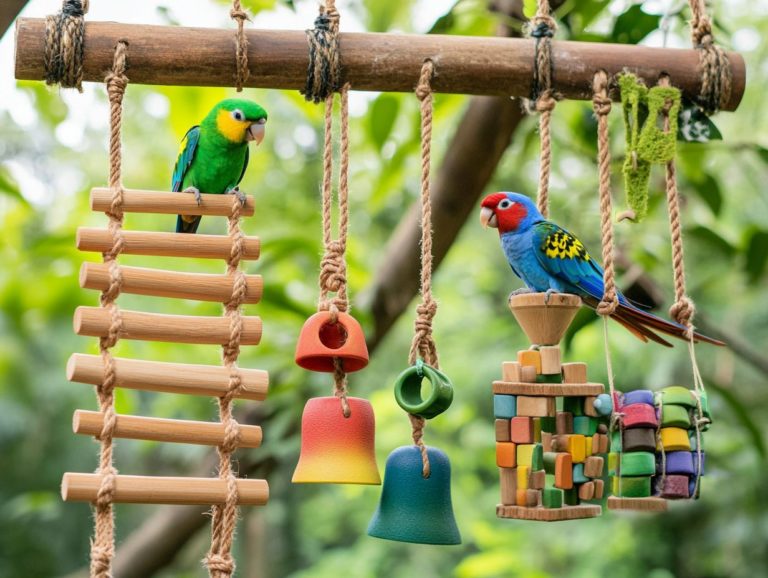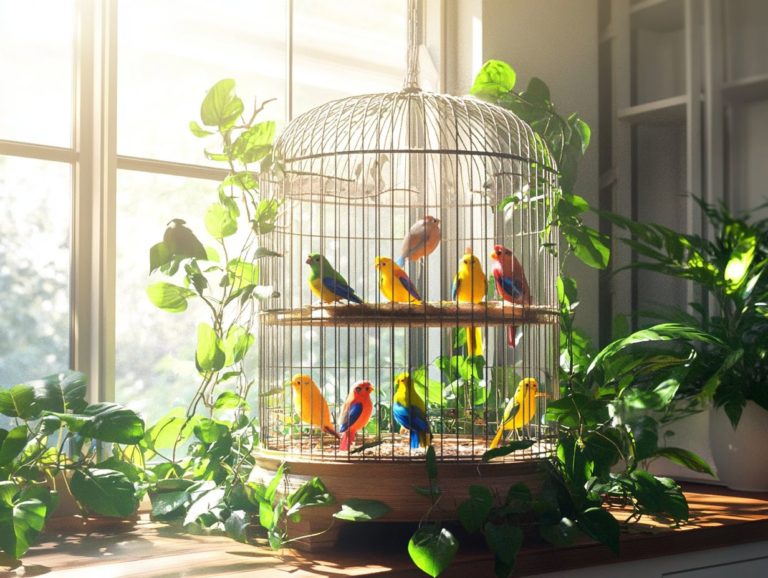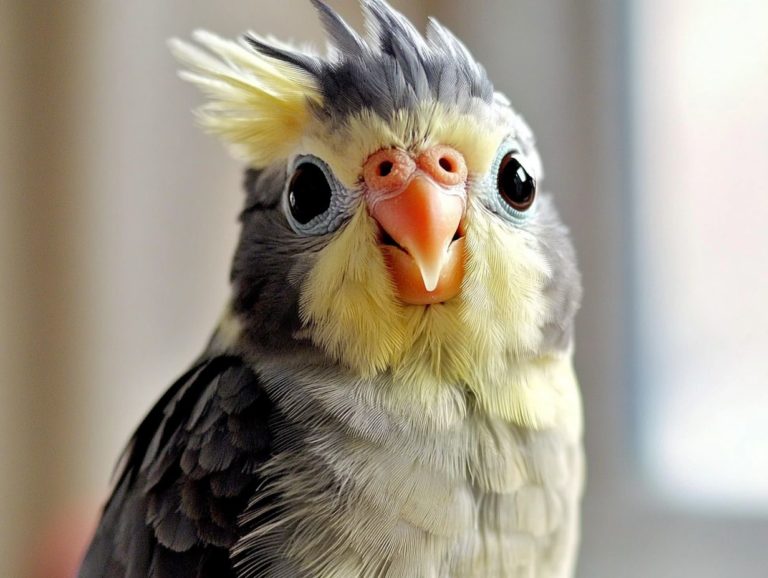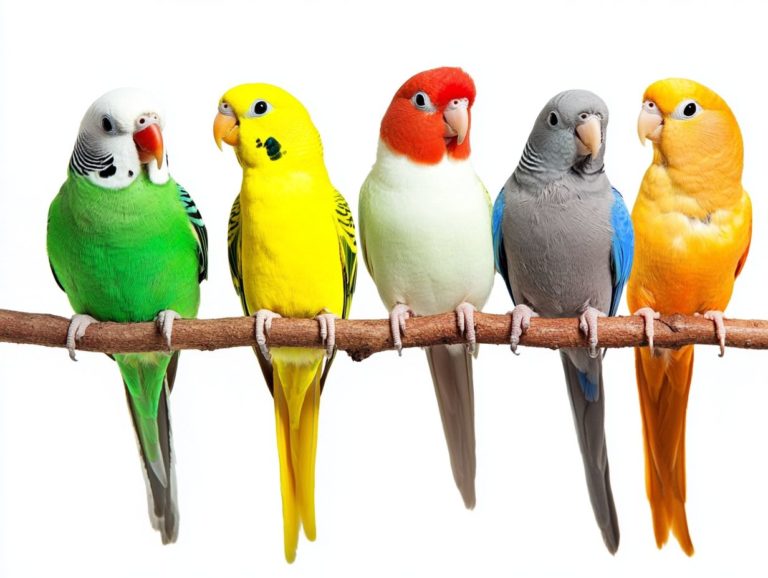African Grey: Caring for Your Intelligent Companion
This guide is perfect for new and prospective African Grey owners. African grey parrots are celebrated for their remarkable intelligence and charming personalities, establishing themselves as some of the most cherished pet companions you could have.
This guide provides essential insights into caring for your African Grey, encompassing proper diet, nutrition, social dynamics, and environmental enrichment to ensure they thrive.
Discover common health concerns, effective training techniques, and ways to cultivate a strong emotional connection with your feathered companion. Dive into tips for creating an ideal environment and understanding their unique characteristics and behavior.
Get ready to take your bond with your African Grey to incredible new heights!
Contents
Key Takeaways:
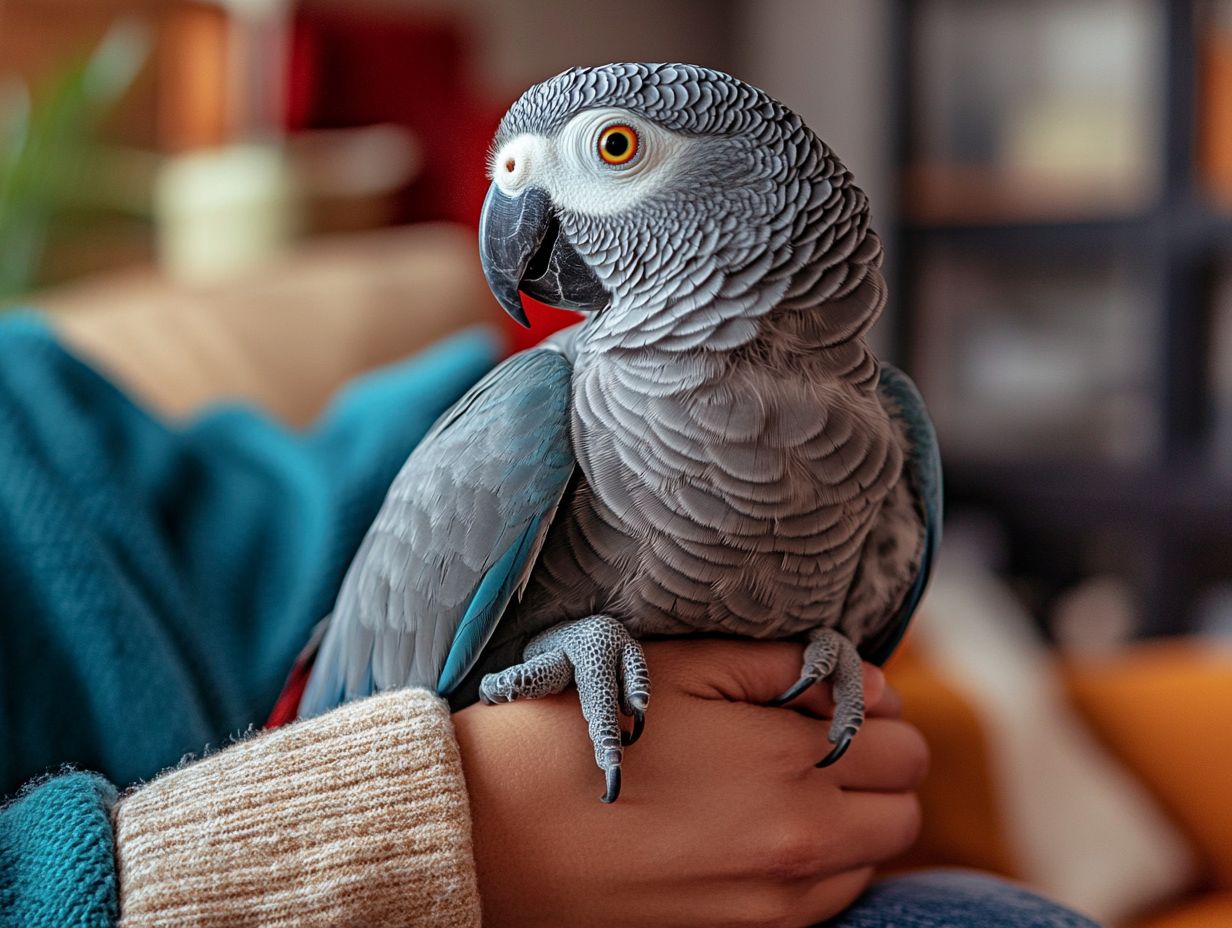
- Proper nutrition and exercise, including a well-rounded pelleted diet, are crucial for the health and well-being of your African Grey. A balanced diet and regular physical and mental stimulation help prevent common conditions.
- Don’t wait to train and socialize your parrot; it s key to building a strong bond! Positive reinforcement techniques can be used to teach tricks and behaviors, while spending quality time together strengthens your relationship and mitigates potential behavioral problems.
- Understanding your African Grey’s behavior, including body language and vocalizations, is key to providing a suitable environment. Regular cleaning of the cage and a parrot-friendly home can help keep your bird happy and healthy.
Species Overview and Characteristics
The African grey parrot, a member of the species Psittacus erithacus, is celebrated for its extraordinary talking ability and vibrant personality, establishing itself as one of the most enchanting family companions among pet birds.
This remarkable creature thrives in the lush rainforests and woodlands of Central and West Africa, where it forms close-knit flocks that highlight its inherently social nature as a highly social animal. Its grey plumage, beautifully complemented by striking red tail feathers, is a perfect blend of aesthetic appeal and practical function in the wild.
Renowned for their impressive cognitive skills, African greys exhibit remarkable problem-solving abilities and can mimic a variety of sounds with astonishing precision, showcasing their vocal skills. This not only underscores their intelligence but also reflects their adaptability in social situations. Their deep emotional bonds with caretakers signify a profound need for social interaction and highlight their nature as intelligent parrots, transforming them from mere pets into beloved members of the family.
Caring for Your African Grey
Caring for your African grey parrot requires a clear understanding of its specific needs, encompassing diet, nutrition, health care, and environmental enrichment. For those interested in avian companionship, caring for your lovebird is also an important consideration to ensure it flourishes as a captivating companion suited for pet adoption.
These intelligent creatures thrive on a well-rounded pelleted diet, like Nutri-Berries, complemented by fresh fruits and vegetables, which is essential for meeting their dietary requirements and preventing vitamin deficiencies, particularly Vitamin A and Vitamin D.
Prioritize preventive care by scheduling regular veterinary check-ups with an avian medicine specialist, the study of bird health, as it is crucial for your pet’s well-being. Providing ample opportunities for interaction and socialization is equally important for their overall health.
Feeding and Nutrition
Feeding your African grey parrot a balanced diet is essential for its overall health and well-being. These remarkable birds have specific dietary needs that must be addressed to prevent lack of nutrients and vitamin deficiencies.
The ideal diet should consist of a high-quality pelleted option, like Nutri-Berries, complemented with a colorful array of fresh fruits and vegetables. This ensures your feathered friend receives the essential vitamins and minerals it requires. Understanding their feeding habits will enable you to maintain a thriving companion.
Incorporate foods like leafy greens. Add carrots and seasonal fruits to engage their natural foraging instincts and align with their evolutionary traits. It s crucial to create a fun feeding routine that your parrot will love!
Be mindful of common deficiencies, such as Vitamin A and calcium imbalances, which can lead to issues like feather plucking. By diversifying their diet and monitoring what they eat, you greatly improve your African grey’s quality of life.
Exercise and Enrichment
Exercise and environmental enrichment are essential for your African grey parrot’s mental and physical well-being. As highly social creatures, they thrive on stimulation and interaction. Regular engagement is vital for any African grey owner.
By providing a variety of toys, opportunities for flight, and engaging activities, you can help prevent feather picking and other common behavioral issues. Spend time with your parrot for play and fun. This builds a secure and happy environment.
Incorporating diverse types of enrichment, like puzzles that challenge their intellect and toys that encourage foraging (searching for food), allows these remarkable birds to express their natural behaviors. Regular social interactions, whether it’s playtime with you or safe companionship with other birds, cultivate a sense of security and happiness.
By ensuring a stimulating environment filled with varied activities and frequent engagement, you can significantly reduce the chances of anxiety or boredom. Ultimately, prioritizing both physical activity and mental stimulation is beneficial for your parrot’s health and enhances the joy of their developmental journey.
Common Health Concerns
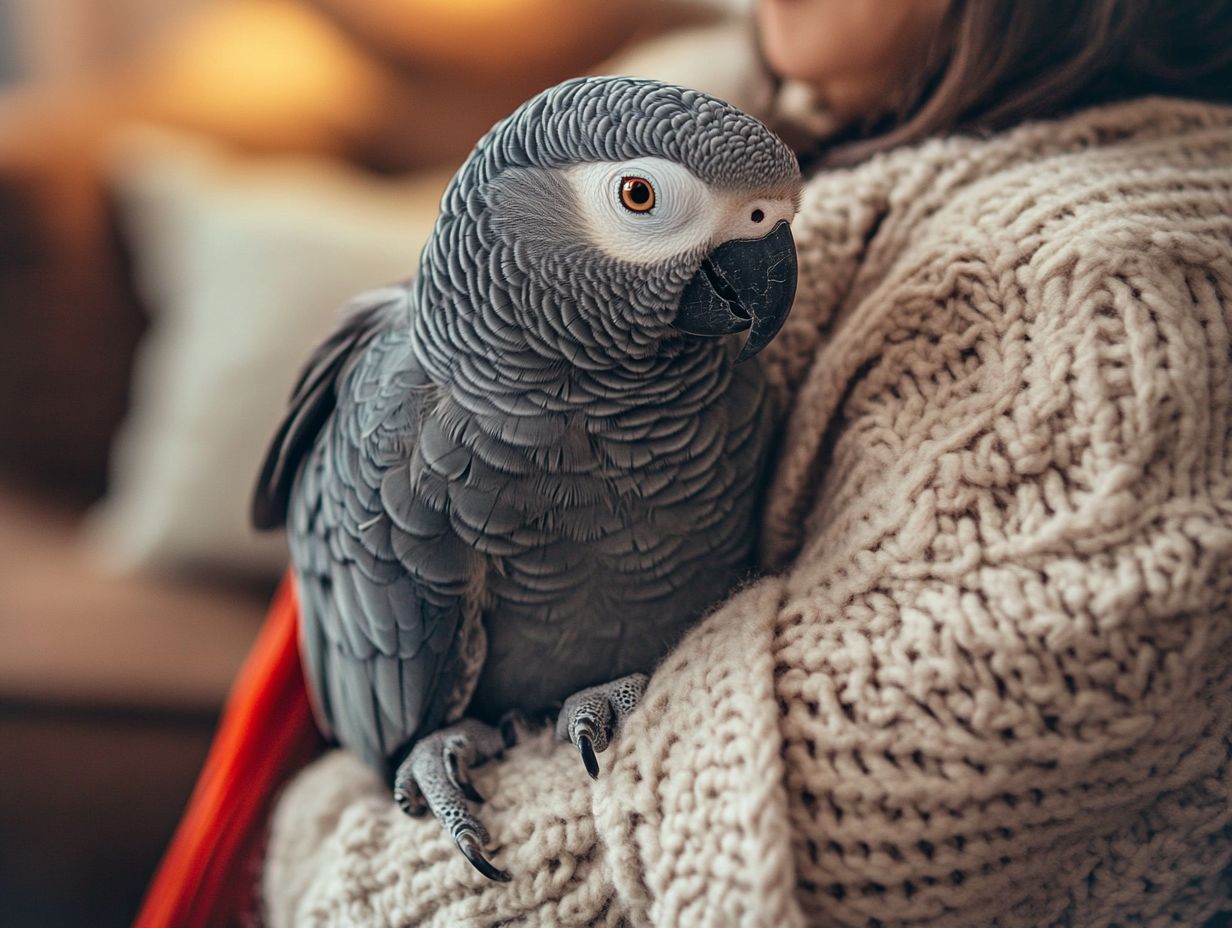
Being aware of common health concerns is essential for you as an African grey owner and caregiver. These intelligent birds are prone to various conditions that demand both preventive care and quick responses from knowledgeable owners.
Don t wait! Regular vet visits help catch health issues early. Partnering closely with a bird doctor ensures any emerging health concerns are addressed swiftly.
These charming parrots often encounter challenges like dietary deficiencies and respiratory diseases, which can be mitigated with proper care and feeding. By providing a balanced diet rich in fruits, vegetables, and high-quality pellets, you can help prevent nutritional imbalances that could lead to serious health problems.
Keep an eye out for signs of illness, like changes in appetite or behavior; this vigilance reinforces the importance of early intervention for issues common among African grey populations.
Training and Socialization
Training and socialization are crucial elements in raising a well-adjusted African grey parrot as a highly social pet companion. These intelligent birds flourish on interaction and mental stimulation, all while honing their impressive voice mimicry abilities as vocal communicators.
A structured training routine enhances their vocal prowess and mitigates potential behavioral issues stemming from boredom or insufficient engagement. This emphasizes the importance of their social nature. Dedicating time to socialization and training cultivates a deeper emotional bond with your feathered companion, enriching both your lives.
Importance of Training
Begin your training journey today and watch your parrot thrive!
Teaching tricks and behaviors to your African grey parrot can be an exciting adventure! By employing positive reinforcement techniques rewarding good behavior you can inspire your parrot to learn a variety of tricks. This not only boosts their thinking skills but also helps prevent boredom-related behavioral issues, ensuring their emotional connection remains strong.
Teaching Tricks
Engaging in trick training stimulates their minds and deepens the bond you share. It can range from simple tasks like having them wave a foot to more intricate feats such as mimicking sounds or phrases. Creating a stimulating training environment encourages your parrot to explore its potential as a highly social animal. Rewarding desired behaviors with treats or praise effectively reinforces their learning.
Incorporating interactive toys during training sessions captures their attention, transforming the experience into both fun and education while enhancing their unique characteristics. These methods expand your parrot’s repertoire of tricks and enhance your understanding of their communicative cues.
As they master new skills, their confidence flourishes, resulting in a happy and well-adjusted companion, making them an ideal family member.
Building a Bond
Building a strong bond with your African grey parrot can be an exciting adventure! These intelligent birds thrive on affection and companionship, which significantly enhances their well-being and unique personality. Regular playtime, social activities, and one-on-one interactions foster trust and affection. This allows your parrot to become a more confident and healthy companion, reducing the risk of common behavioral problems.
To deepen this relationship, recognize the unique personality traits of your parrot. Each bird has its own quirks and preferences, so take the time to observe their behavior and discover the activities they enjoy most.
Offering a variety of toys, engaging in vocal mimicry, and doing fun training exercises together are excellent ways to stimulate their intelligence and curiosity. Establishing a structured daily routine that incorporates interaction lays a solid emotional foundation and encourages positive social behavior, reinforcing the notion that your parrot is a cherished family member.
Providing a Suitable Environment
Creating an optimal environment for your African grey is vital for its overall health and happiness. The right cage setup and a parrot-friendly home can profoundly influence its quality of life.
Envision a spacious cage adorned with perches, toys, and plenty of room for movement this is essential. Regular cleaning the cage is equally important to maintain hygiene and comfort.
By crafting an engaging atmosphere with enriching activities, you can ensure your feathered companion stays both stimulated and content, especially considering its dietary needs as an intelligent bird.
Start your training today, and see how your parrot s personality shines!
Cage Setup and Maintenance
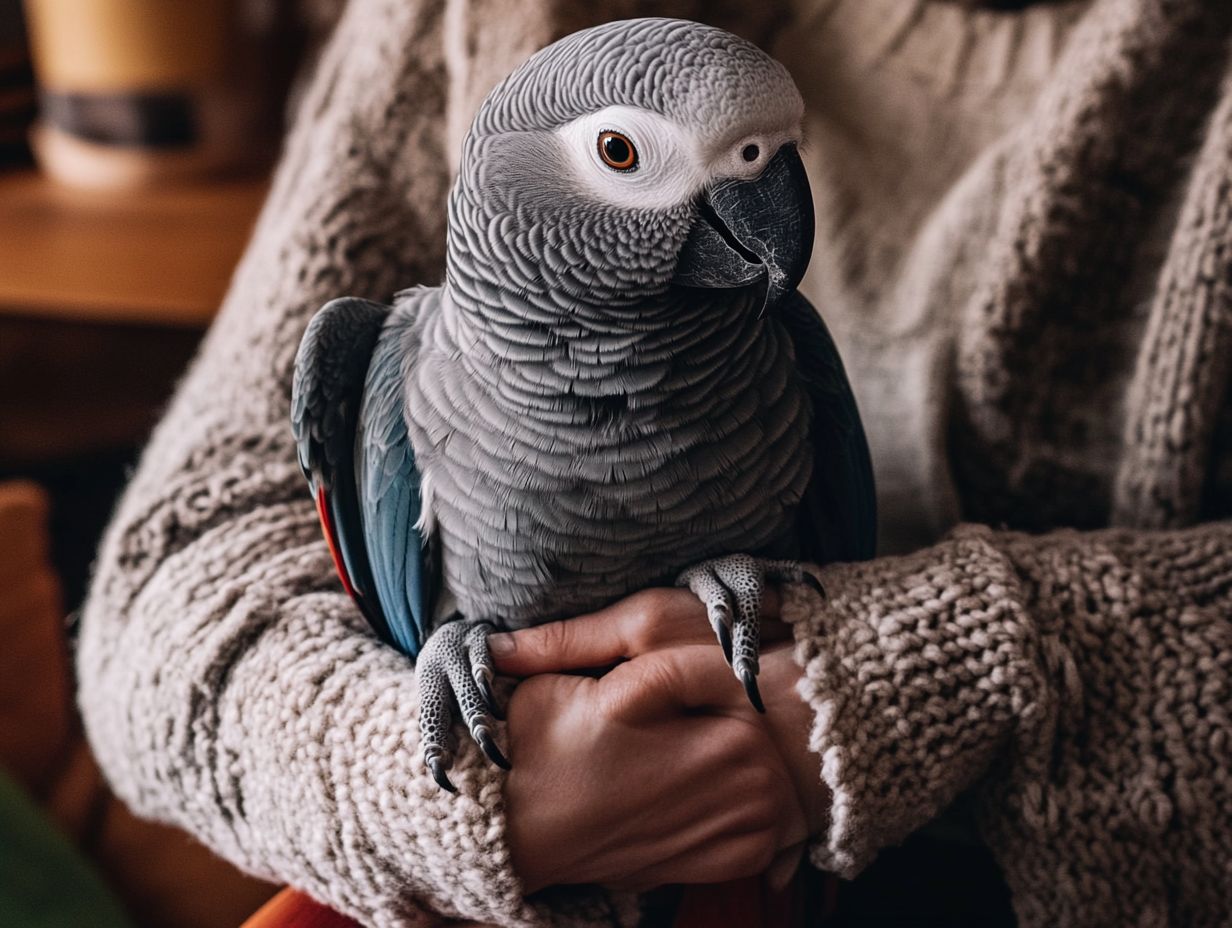
Creating the perfect habitat for your African grey parrot hinges on a proper cage setup and regular maintenance. This ensures your feathered friend feels safe and comfortable in its environment, which is critical for its emotional connection with you.
When you select a cage, consider not just the dimensions but also the materials used. Some materials can be harmful to these intelligent birds. A variety of perches think natural wood and different textures will keep their feet healthy and engaged.
Integrating toys that encourage problem-solving is essential for mental stimulation, playing a vital role in their thinking skills. Maintaining a clean environment means regularly cleaning food and water dishes, replacing soiled bedding, and sanitizing cage surfaces to minimize disease risk.
By prioritizing cleanliness and providing enriching activities, you can significantly enhance the quality of life for your pet companion.
Creating a Parrot-friendly Home
Creating a parrot-friendly home is about ensuring safety, comfort, and opportunities for interaction key ingredients for the well-being of your African grey parrot. Choose areas where your bird can safely explore, provide intellectually stimulating toys, and maintain an environment free from hazards. Infusing elements of environmental enrichment promotes interaction and crafts a harmonious living space for your feathered companion.
To elevate your African grey s environment, establish designated play zones with climbing structures and perches at various heights. This allows for natural movement and exploration that they thrive on. Always choose non-toxic materials when selecting toys and incorporate foraging opportunities that mimic their natural behaviors.
Regular socialization will strengthen your bond and provide much-needed mental stimulation and emotional enrichment. Consider adding safe plants and shelves for visual interest. This will further pique your parrot s curiosity while ensuring a secure and enriching atmosphere.
Understanding Your African Grey’s Behavior
Understanding your African grey’s behavior is essential for nurturing a healthy relationship with your pet. These intelligent birds express themselves through a rich tapestry of body language and vocalizations that reveal their needs and emotions.
By honing your ability to interpret these signals, you can effectively address any behavioral issues that arise, enhancing the well-being of your feathered companion. Recognizing their unique personality traits paves the way for more meaningful interactions and a deeper, more rewarding bond.
Interpreting Body Language and Vocalizations
Interpreting your African grey parrot’s body language and vocalizations is crucial for understanding its emotional state and ensuring its needs are met. Observing subtle shifts in posture, feather positioning, and vocal sounds gives valuable insight into whether your parrot is happy, stressed, or in need of attention. This awareness enables you to address potential behavioral issues and strengthen your bond with your feathered companion.
Familiarizing yourself with these forms of communication reveals a range of emotional responses. For instance, a puffed-up chest may indicate agitation or discomfort, while relaxed feathers often signal contentment. Vocalizations are equally important; a soft cooing could express affection, while loud squawking might signify anxiety or a desire for interaction.
By being attentive to these signals, you can respond more effectively, creating a harmonious environment that nurtures your parrot’s social and psychological well-being and caters to their dietary needs.
Frequently Asked Questions
What is an African Grey parrot?
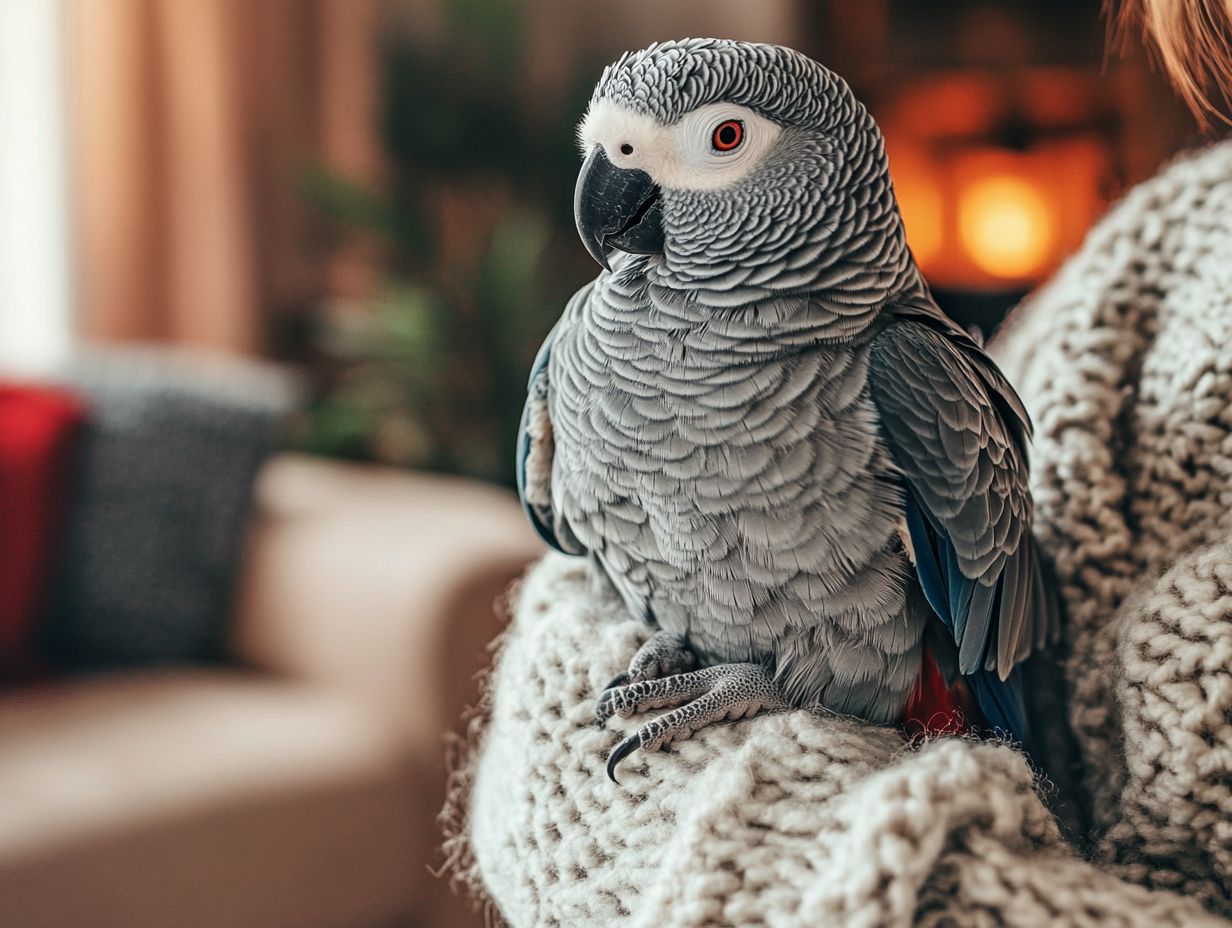
An African Grey parrot is a medium-sized parrot species native to Africa, particularly the Congo African Grey and Timneh African Grey. They are known for their high intelligence and ability to mimic human speech due to their exceptional talking ability.
What do African Grey parrots eat?
African Grey parrots should have a balanced diet consisting of a pelleted diet, fresh fruits, vegetables, and occasional treats like nuts and seeds.
Avoid feeding them avocado, chocolate, or caffeine, as these can be toxic to parrots and lead to vitamin deficiency and other health problems.
How do I train my African Grey parrot?
African Grey parrots are highly intelligent birds that can be trained using positive reinforcement techniques. Be patient and consistent with your training.
Always reward good behavior with treats or praise to reinforce their behavioral skills.
Do African Grey parrots need a lot of attention?
Yes, African Grey parrots are social birds and need daily interaction and mental stimulation to thrive. Spend at least a couple of hours each day playing with and talking to your parrot.
They flourish with social dynamics.
Do African Grey parrots make good pets?
With the right care, African Grey parrots can be wonderful companions! They require a lot of attention and proper care and feeding.
Ensure you are ready for the commitment before bringing one into your home.
How can I keep my African Grey parrot healthy?
To keep your African Grey parrot healthy, provide a balanced diet, regular exercise, and annual check-ups with a bird vet who knows about bird health.
Also, provide plenty of toys and mental stimulation to prevent boredom and potential behavioral issues.

